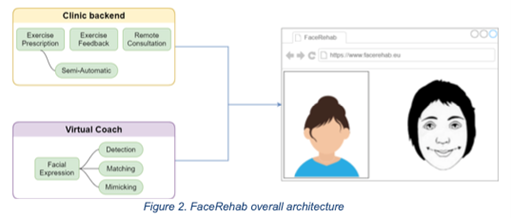FaceRehab involves all end-user groups throughout the project in order to really fulfill the needs and to understand the issues related to remote healthcare solutions for medical professionals. The involvement of all levels of end-user is explained, with the benefits clearly articulated, including how the solution will form part of the care pathway for people with facial paralysis and what the associated outcomes will be for the different end-user groups when compared to the existing interventions available to treat and support people with such health problems.
FaceRehab will co-develop a device and its associated software that will address the specific requirements of the end-users involved in facial paralysis rehabilitation. The device will include the user interfaces and sensors that will allow human-machine interaction. Overall, FaceRehab is taking inspiration from the integration of a virtual coach and the therapists common practices into the solution. According to the end-users, FaceRehab is particularly welcome as this is likely to assist the person in carrying out their rehabilitation exercises correctly and potentially lead to quicker and improved outcomes.
Objectives
FaceRehab will develop a solution for supporting facial rehabilitation exercises at home using technology as a mean to improve digital transformation of the health and care for people affected with Facial Paralysis. It will contribute to integrate actions of formal and informal carers using a common ICT-based solution by extending rehabilitation programs performed in hospital or clinical environments to the community setting. In particular, FaceRehab will address the need for technological solutions that monitor the realization of facial paralysis rehabilitation exercises at home. A need felt by patients, physical therapists, occupational therapists and speech therapists while undergoing a rehabilitation program.
Expected results and impact
FaceRehab expects to improve the quality of life (QoL) for primary end-users. The most important contribution to the QoL provided by FaceRehab solution is that it is addressing an often disregarded but prevalent problem of facial nerve paralysis. This consequence can be caused by an acute event like stroke, but it can also appear without an apparent cause. It has devastating consequences on self-esteem and causes self-isolation, physical issues (deglutition, corneal protection, dampening of noise) and mental disorders. The paralysis results in facial asymmetry that alters identity, ability to communicate, and effective expression of emotion. FaceRehab aims to develop a solution that can support better and quicker rehabilitation through exercises and bio-feedback at home, which will have a great impact on peoples’ lives.
Partners
Partners involved in the project
| Organization |
Type |
Country |
Website |
| Instituto Pedro Nunes |
R&D |
Portugal |
www.ipn.pt |
| Centro de Medicina Fisica e Reabilitação - Fisioermesinde |
SME |
Portugal |
|
| ThinkDigital |
SME |
Portugal |
|
| Parc Sanitari Sant Joan de Déu |
End User |
Spain |
|
| Rehazenter |
End User |
Luxembourg |
|
- Project name: Facial paralysis Rehabilitation at home (FaceRehab)
- Website: http: //facerehab.las.ipn.pt
- Coordinator: Instituto Pedro Nunes – IPN
- Duration: 24 months
- Starting Date: 01/05/2021
- Total budget: 821 812, 5€
- Public contribution: 681 906,25 €
Contact
João Quintas
E.: jquintas@ipn.pt
T.: +351239700933

